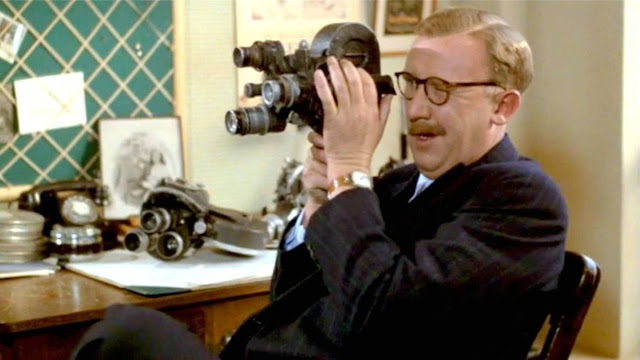Newsfront
One's education in Australian cinema must certainly include 1978's NEWFRONT, a nostalgia piece that is clever and moving in roughly equal measure. It is very much a product of its homeland: understated, deliberate, and erudite. Director Philip Noyce achieved his first true success with this picture, one that looks back at the newsreel industry's final heyday in the 1940s and 50s. Noyce ingeniously combines real footage audiences in Sydney and elsewhere would've seen in movie theaters in those days with story threads about the newsreel production houses and their staff members. Sometimes the fiction remains in newsreel black and white, other times immediately switches to color. Trying to discern why each choice is made is part of the fun.
Veteran actor Bill Hunter is excellent as Len Maguire, the star cameraman at Cinetone. He has built a reputation as somewhat of a daredevil, always ready to jump into the muck to capture political rallies or car wrecks. Maybe even a fight among swimmers in an Olympic event. But he is a stable company fella, never eager for change. He has very high standards, and is essentially married to his work. His first wife, mother of his two children, learns this firsthand. Likely more suitable for him is co-worker Amy (Wendy Hughes, luminous) who shares his long hours in the editing bay and his drive for quality. Fascinating stuff, those scenes of how a newsreel is perfected in post production. Also there is Geoff, an early performance by Bryan Brown, whose negative cutting deserves as much credit for that perfection as does anything otherwise.
Len's brother Frank (Gerard Kennedy) works at a competing company. He itches to travel abroad, perhaps find a career in Hollywood. The contrasts between the men are examined in the opening and closing scenes of NEWSFRONT, and provide (among other things) some commentary on the art versus commerce debate. The film also takes time to show us the lives of Chris (Chris Haywood), Len's eager assistant, and others at Cinetone. Some nice character vignettes. I was slightly disappointed that we didn't get more scenes with them, and the events in their lives (sometimes quite tragic) are seen as if in a highlight reel. NEWSFRONT skips along from event to event, perhaps unfolding a bit too fast. But maybe Noyce and co-writer Bob Ellis intended that effect to match how a typical newsreel would play.
Of that, we get coverage of key political events such as the referendum in 1951 to ban the Communist Party and the Redex Reliability Trial, a road race across the continent. The rabbit plague and Prime Minster elections are also featured. As mentioned, these clips were culled from actual newsreels. NEWSFRONT's most impressive bit of seamlessness is the inclusion of scenes of the great flood in Maitland in 1955 intertwined with the Cinetone crew's attempted navigation of it. It also concludes with arguably the film's most emotional scene. And Noyce doesn't overdo it or any other such moments in his wonderful movie.
Looming over the entire story is the threat of television to the newsreel industry. This element was likewise underplayed - there are no huge sequences of clumsy symbolism or character outburst. Len and company see the handwriting on the wall, and act accordingly.



Comments